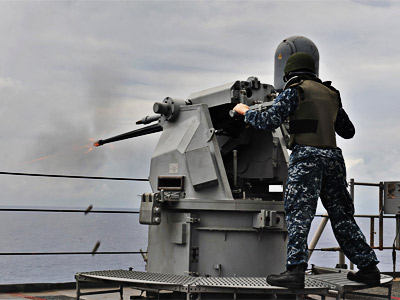Deterrence After the Cold War
Why did we unlearn strategic lessons so quickly?
 Richard Betts offers a characteristically perspicuous essay in the newest Foreign Affairs about what has happened to the U.S. use—or nonuse, or misuse—of deterrence in the years since the Cold War. His overall observation is that the United States appears to have unlearned some of the lessons that it successfully applied during the Cold War. It has used the mechanisms of deterrence in situations where this use has needlessly worsened relations with the apparent target of the deterrence; confronting Russia with an expanded NATO is the leading example that Betts analyzes. Conversely, the United States has failed to use deterrence in situations where it should have done so. Here the glaring example is the George W. Bush administration's launching of a war against Iraq—rather than relying on deterrence to keep Saddam Hussein where Secretary of State Colin Powell said he was as of May 2001: “in a box.”
Richard Betts offers a characteristically perspicuous essay in the newest Foreign Affairs about what has happened to the U.S. use—or nonuse, or misuse—of deterrence in the years since the Cold War. His overall observation is that the United States appears to have unlearned some of the lessons that it successfully applied during the Cold War. It has used the mechanisms of deterrence in situations where this use has needlessly worsened relations with the apparent target of the deterrence; confronting Russia with an expanded NATO is the leading example that Betts analyzes. Conversely, the United States has failed to use deterrence in situations where it should have done so. Here the glaring example is the George W. Bush administration's launching of a war against Iraq—rather than relying on deterrence to keep Saddam Hussein where Secretary of State Colin Powell said he was as of May 2001: “in a box.”
In addition to the issues of NATO and relations with Russia, Betts draws policy implications regarding the handling of Iran. He reviews the reasons—which ought to be easy to understand, but seemingly to many people aren't—why deterrence of even a nuclear-armed Iran is far preferable to launching a war against Iran. He also criticizes as sometimes muddled and inconsistent the way deterrence figures into the U.S. approach toward China and the Far East—scene of a Cold War failure to use deterrence properly, in Korea in 1950. Betts appears to prefer a clear either/or approach to deterrence, in which we make unmistakable the places where we are willing to respond forcefully while not leading others to believe that we are making deterrent threats in other places.
This preference leads to one point on which Betts's analysis can be challenged, as it relates to Cold War deterrence of the USSR. Insofar as U.S. nuclear weapons figured into deterrence of a Soviet invasion of Western Europe, there necessarily was some ambiguity. The West never did come up with a good answer to the question of whether, and why, the United States would risk incineration of New York for the sake of saving Hamburg. But that involves an unresolvable point of historical debate. On matters of current policy relevance, Betts's observations are astute.
Betts does not really address why lessons were unlearned and the same nation's use of a strategic concept as basic as deterrence has been so much less skillful in the past couple of decades than it was for most of the four decades before that. Let me offer two explanations.
One is that this is another indication of the tendency, which Americans in particular exhibit, to overestimate the newness of things, especially when moving from one identifiable era to another. A drastically changed world was the common way of looking at the end of the Cold War. The nature of threats was seen as having become thoroughly different from before, and thus altogether different strategies had to be used. Such views were significant exaggerations of actual change. But it nevertheless meant that many Cold War lessons were discarded not only because one generation succeeded another but also because the lessons were mistakenly seen as obsolete.
The other explanation involves the post-Cold-War-victory hubris of the unipolar moment. Some—including some who got into positions to shape policy—thought we didn't have to think as much about deterrence anymore because the United States now had the freedom and the power to accomplish much more directly through the application of military force, and to do so by taking the initiative rather than waiting to respond to someone else's transgression. The Iraq War demonstrated some of what was wrong with that line of thinking. But some lessons not only get forgotten; in some quarters they never seem to get learned in the first place.
